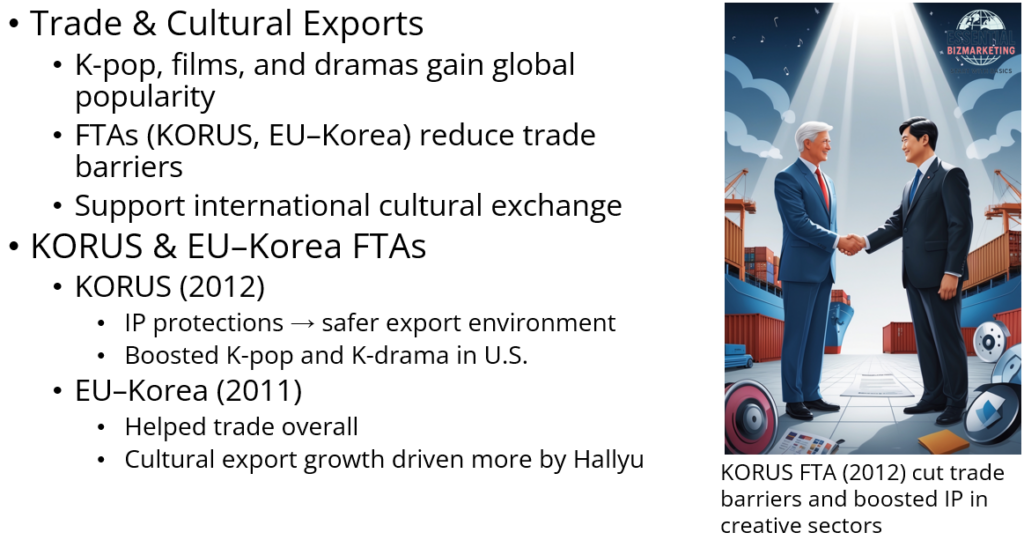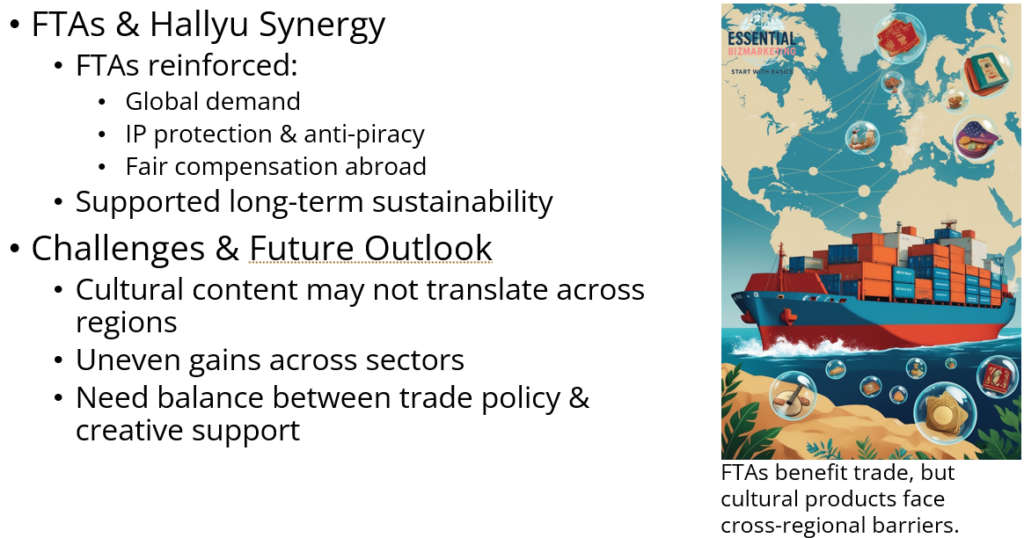Introduction: The Intersection of Trade and Culture

South Korea’s cultural exports—including K-pop, films, and television dramas—have gained tremendous popularity around the world. The rise of these cultural products on the global stage has been supported in part by Free Trade Agreements (FTAs), such as the Korea–United States Free Trade Agreement (KORUS FTA) and the Korea–European Union Free Trade Agreement (EU-Korea FTA). These agreements have played an important role in removing trade barriers and fostering favorable conditions for international cultural exchange.
The KORUS FTA and Its Influence on Cultural Exports
Implemented in 2012, the KORUS FTA aimed to eliminate trade barriers between South Korea and the United States. While primarily focused on goods and services, the agreement included provisions affecting the creative industries, particularly in terms of intellectual property protection. These provisions helped create a secure environment for the export of Korean cultural content. As a result, K-pop and Korean dramas gained a stronger foothold in the U.S. market, and cross-cultural consumption increased accordingly.
EU–Korea FTA and Cultural Trade Dynamics
The EU–Korea FTA, enacted in 2011, contributed to significant growth in bilateral trade between South Korea and the European Union. However, its direct impact on cultural exports was more nuanced. Studies suggest that while the agreement may not have significantly increased the export of consumer goods, it helped facilitate high-tech exports. Cultural content, meanwhile, benefited more from the organic spread of the Korean Wave (Hallyu) than from the FTA itself, although reduced tariffs and legal harmonization certainly helped.
The Korean Wave Amplified by FTAs

The global rise of Hallyu has created strong international demand for Korean cultural content. FTAs have complemented this trend by reducing trade barriers and strengthening legal protections for intellectual property. For instance, the KORUS FTA helped combat piracy and ensured that Korean creators and producers could receive fair compensation for their work abroad. In this sense, FTAs served to reinforce the sustainability of Korea’s creative exports in foreign markets.
Challenges and Considerations
Despite the benefits of FTAs, challenges remain. Cultural products often embody national identity and values, which may not always translate easily across different regions. Moreover, the economic gains from FTAs can be unevenly distributed across sectors, highlighting the need for balanced strategies that also support domestic creative industries.
Conclusion: Balancing Trade Policy and Cultural Innovation
Free Trade Agreements such as KORUS and the EU–Korea FTA have positively influenced South Korea’s cultural exports by removing obstacles and ensuring legal safeguards. However, the intrinsic appeal and global momentum of Korean pop culture remain the primary engines of success. Going forward, a balanced approach that leverages international trade policy while nurturing cultural creativity will be essential to sustaining South Korea’s influence on the global cultural stage.
📚 References
Center for Strategic and International Studies. (n.d.). The strategic benefits of KORUS. Retrieved March 25, 2025, from https://www.csis.org/analysis/strategic-benefits-korus
European Commission. (n.d.). EU–South Korea Free Trade Agreement. Retrieved March 25, 2025, from https://trade.ec.europa.eu/access-to-markets/en/content/eu-south-korea-free-trade-agreement
Freie Universität Berlin. (2019). Korea Focus Working Paper No. 9. Retrieved March 25, 2025, from https://www.geschkult.fu-berlin.de/e/oas/korea-studien/korea-eu/kdi-files/working-paper/Korea-Focus-Working-Paper-No_-9.pdf
Korea Economic Institute of America. (2016). The KORUS FTA and the creative industries. Retrieved March 25, 2025, from https://keia.org/the-peninsula/the-korus-fta-and-the-creative-industries/
📁 Start exploring the Blog
📘 Or learn more About this site
🧵 Or follow along on X (Twitter)
🔎 Looking for sharp perspectives on global trade and markets?
I recommend @GONOGO_Korea as a resource I trust and regularly learn from.
